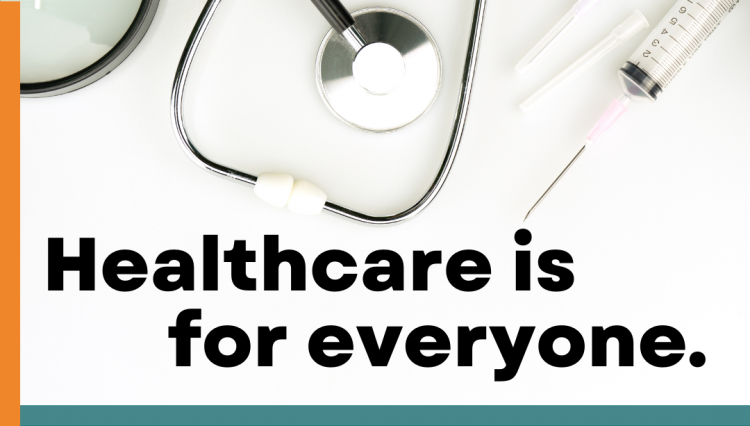Your physical and mental health and overall wellbeing are a top priority in the Miramar Dreamers Support Office. A variety of resources, support programs, and departments are available to students covering their basic needs like food, transportation, and hygiene needs and their physical and mental health.
Jump to
Basic Needs | Clubs | Harassment | Mental Health | Physical Health | Undocu-Queer
Basic Needs Resource Center
The Miramar College Basic Needs Resource Center also offers students FREE groceries, pantry items, ready-to-eat meals and snacks, toiletries and clothing (when available), shower facilities for unhoused students, and information on FREE and low-cost technology and transportation resources.
Student Clubs
Building community is important for all students. Undocumented and immigrant students face many challenges to building communities once they find themselves in a new country. We encourage you to explore the many student clubs and organizations at Miramar College to help you find allies and build your support network!
Harassment: Title IX
Everyone is Protected from Discrimination & Harassment - Even Undocu-Students! The San Diego Community College District is committed to providing a safe and equitable learning and working environment for all students and employees, free from sexual harassment, sexual violence, dating violence, domestic violence, stalking, and any other sex-based or gender-based misconduct.
If you need to file a report but are worried about your immigration status, please note the following: Members of the San Diego Community College District community can report sex or gender based offenses, including an incident of dating violence, domestic violence, sexual assault, or stalking, to law enforcement, to the District, to both, or to neither. A report does not need to be made by the victim of an incident, but may be made by a third party.
- Go to a safe place! In an emergency, call 911
- Present evidence: Do not bathe, douche or brush your teeth. Do not wash your clothing, linens, or the area where the assault occurred. Preserve text messages, voice mail messages, and any other evidence.
- Consider contacting confidential resources for support and guidance
- Mental Health Services (K2-102): 619-388-7881
- Consider reporting the incident to law enforcement
- San Diego Community College District Police Department: 619-388-6405
- Local Law Enforcement: 619-531-2000
- Consider reporting the incident to the school's Title IX Coordinator
- Title IX Deputy Coordinator: Dr. Cheryl Barnard (K1-210): 619-388-7313
- Seek available resources, including medical attention
- Student Health Services (K2-102): 619-388-7881
- Seek accommodations to work or school as necessary
- Consent: Affirmative, conscious and voluntary agreement to engage in sexual activity. Affirmative consent must be ongoing and can be revoked at any time. Silence, the existence of a dating relationship or past sexual relations, is not by itself assumed to be an indicator of consent.
- Dating Violence: Violence committed by a person who is or has been in a social relationship of a romantic or intimate nature with the victim.
- Domestic Violence: A crime or violence committed by a current or former spouse or intimate partner of the victim, a person with whom the victim shares a child in common, a person who is cohabitating with or has cohabitated with the victim as a spouse or intimate partner, a person similarly situated to a spouse of the victim under the domestic or family violence laws of the jurisdiction in which the crime of violence occurred, or by any other person against an adult or youth victim who is protected from that person's acts under the domestic or family violence laws of the jurisdiction in which the crime of violence occurred.
- Sexual Assault: A sex offense directed against another person, without the consent of the victim, including instances where the victim is incapable of giving consent.
- Stalking: Engaging in a course of conduct directed at a specific person that would cause a reasonable person to fear for the person's safety or the safety of others, or suffer substantial emotional distress.
Source: SDCCD Title IX Resource Guide
Mental Health
Mental Health Counseling provides short term clinical services to help students optimize their learning and growth and help students decrease stress for academic and personal success. Our mental health staff work with students to develop coping strategies and problem solving skills. Crisis intervention and referrals are also provided.
Counselors and therapists are licensed professionals in Marriage & Family Therapy and Psychology. Students can access a limited number of sessions and may be refer to community providers for those who will benefit from an extended therapeutic relationship or need long-term services, including for addictions or psychiatric medication.
If you are a currently enrolled student at Miramar College and would like to schedule an appointment with a Mental Health Counselor call 619-388-7881.
If you are struggling with overwhelming stress or are in need of immediate mental health support, call the ACCESS & CRISIS 24 Hour Hotline (SD County) at 1-888-724-7240 or text "COURAGE" to 741741. During a physical or mental health emergency call 9-1-1.
Enroll in the Mental Health Canvas Shell
211 San Diego
211 San Diego is a local nonprofit organization and the region’s trusted source for information and connections to community, health, and disaster resources. Help is available 24 hours a day, 365 days a year, and in more than 200 languages. With a database of more than 6,000 services and resources that are updated on a real-time basis, Community Connectors help connect San Diegans to the accurate information they need.
Dial 211 from anywhere in the U.S. for information on local resources for food, housing, job support, health, human trafficking or disaster assistance.
Local Resources
- NAMI San Diego Helpline: 800-523-5933 or 619-543-1434
- San Diego Warm Line (peer support): 800-930-9276
National Resources
- Access & Crisis Line: 888-724-7240
- Suicide Prevention Lifeline: 800-273-8255
- Domestic Violence/Sexual Assault Crisis Hotline: 888-385-4657
- Crisis Text Line: Text "COURAGE" to 741741
Physical Health
Health care handled conveniently, compassionately, and cost-effectively. While serious or complicated medical conditions may be referred to providers outside of Miramar's Student Health Services for further evaluation and treatment, many services and care are given here on-campus.
Add Student Health to Your Canvas Dashboard
Alcohol use rates among college student populations and among immigrant populations are both higher than that of the general native-born US citizen population. Moving to a new country and coping with complex immigration statuses—especially for DACA beneficiaries—is stressful, and many individuals turn to alcohol. The Centers for Disease Control and Prevention (CDC) advises even one alcoholic drink can have negative physical and mental health effects.
Alcohol use and misuse, including legal repercussions such as getting a DUI, can have negative affects on your immigration status. You can be denied citizenship, you can have your TPS revoked, or you may lose your DACA protection, among other repercussions.
If you are struggling with alcohol dependency, the college can provide you with resources. Contact the Miramar Student Health Center at sdmiramar.edu/services/healthcenter.
Background Information
- Legal for medical use in 38 states & D.C.
- Legal for recreational use in 21 states & D.C.
- Distribution, possession, & use are all illegal in the U.S. federally; marijuana is a Schedule I drug!
Marijuana Use & Your Immigration Status
- Even if you live in a state that has decriminalized marijuana or where marijuana is legal in any respect, your immigration status can be negatively affected
- You do not need a marijuana conviction to be at risk
- Admitting to ever using or possessing marijuana to a law enforcement officer or immigration official can disqualify you from gaining or keeping lawful status and you can be detained and deported!
Your Rights & Responsibilities
- Do not use marijuana if you are not a U.S. citizen
- Never leave the house carrying marijuana, a medical use card, paraphernalia, accessories, or apparel used for or depicting marijuana
- If you have a genuine medical necessity and there is no good alternative to marijuana, consult an attorney
- Never discuss marijuana use or possession with law enforcement officers or immigration officials
- You have the right to remain silent
- If asked about marijuana, state that you do not want to talk with the law enforcement officer/immigration official and that you want to talk to a lawyer
- If you do admit to use or possession get an attorney immediately!
If you are struggling with drug dependency, the college can provide you with resources. Contact the Miramar Student Health Center at sdmiramar.edu/services/healthcenter.
Undocu-Queer: LGBTQ Resources
Intersecting identities, like being an undocumented member of the LGBTQ+ community can present additional boundaries to access and success. Many individuals come to the U.S. to escape persecution for their gender expression and/or sexual orientation. San Diego Miramar College welcomes and celebrates all members of the LGBTQ+ community regardless of status. Visit sdmiramar.edu/services/studentaffairs/lgbtq for more campus information and resources, including student organizations, employee resources, facilities, and policies that support LGBTQ+ students and staff.
Help is available:
- The San Diego LGBT Community Center
Emergency Services: 619-692-2077 ext. 211 - The Trevor Project
Crisis & Suicide Prevention Lifeline: 1-866-488-7386 - Trans Lifeline’s Hotline: 877-565-8860



